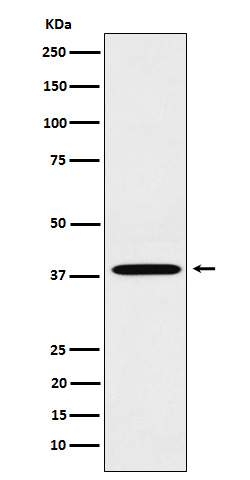
| WB | 咨询技术 | Human,Mouse,Rat |
| IF | 咨询技术 | Human,Mouse,Rat |
| IHC | 1/100-1/200 | Human,Mouse,Rat |
| ICC | 技术咨询 | Human,Mouse,Rat |
| FCM | 咨询技术 | Human,Mouse,Rat |
| Elisa | 咨询技术 | Human,Mouse,Rat |
| Aliases | BLT; BLT1; BLTR; CMKRL1; GPR16; LTB4R1; LTBR1; P2RY7; P2Y7;;LTB4 R1 |
| WB Predicted band size | 38 kDa |
| Host/Isotype | Rabbit IgG |
| Antibody Type | Primary antibody |
| Storage | Store at 4°C short term. Aliquot and store at -20°C long term. Avoid freeze/thaw cycles. |
| Species Reactivity | Human |
| Immunogen | A synthesized peptide derived from human LTB4 R1 |
| Formulation | Purified antibody in PBS with 0.05% sodium azide,0.05% BSA and 50% glycerol. |
+ +
以下是关于LTB4R抗体的3篇参考文献及其摘要概述:
---
1. **文献名称**:**"A monoclonal antibody against the leukotriene B4 receptor BLT1 suppresses neutrophil migration and inflammation"**
**作者**:Yokomizo, T., Izumi, T., Shimizu, T.
**摘要**:该研究开发了一种靶向LTB4R(BLT1)的单克隆抗体,在急性炎症模型中验证其效果。实验显示,该抗体通过阻断LTB4介导的信号通路,显著抑制中性粒细胞向炎症部位的迁移,提示其潜在治疗价值如哮喘和关节炎。
2. **文献名称**:**"Targeting LTB4/BLT1 signaling in cancer: Inhibition of angiogenesis and tumor growth by anti-BLT1 antibody"**
**作者**:Matsunaga, Y., et al.
**摘要**:本文探讨LTB4R抗体在肿瘤微环境中的作用。研究发现,抗体通过阻断BLT1受体,抑制肿瘤相关巨噬细胞驱动的血管生成,从而减缓小鼠模型中结肠癌的生长和转移。
3. **文献名称**:**"Anti-leukotriene B4 receptor antibody therapy attenuates atherosclerosis in murine models"**
**作者**:Haribabu, B., et al.
**摘要**:研究评估了LTB4R抗体在动脉粥样硬化中的疗效。结果显示,抗体治疗减少了斑块内炎症细胞浸润和促炎细胞因子表达,表明靶向LTB4R可能成为心血管疾病的干预策略。
---
这些文献聚焦于LTB4R抗体在不同疾病模型中的治疗潜力,涵盖炎症、癌症和心血管领域。如需具体文章,建议通过PubMed或SciHub检索标题进一步获取全文。
The leukotriene B4 receptor (LTB4R), also known as BLT1. is a G protein-coupled receptor (GPCR) that binds leukotriene B4 (LTB4), a potent lipid mediator derived from arachidonic acid. LTB4R plays a critical role in inflammatory and immune responses by mediating chemotaxis, degranulation, and cytokine release in neutrophils, macrophages, and T cells. Its activation is linked to chronic inflammatory diseases, including asthma, rheumatoid arthritis, atherosclerosis, and psoriasis, making it a therapeutic target for anti-inflammatory drug development.
LTB4R antibodies are essential tools for studying receptor expression, localization, and signaling mechanisms. They are widely used in techniques such as Western blotting, immunohistochemistry (IHC), and flow cytometry to investigate LTB4R distribution in tissues or cell lines under pathological conditions. Some antibodies block LTB4 binding, serving as antagonists to study receptor-ligand interactions or evaluate therapeutic candidates. Recent research also explores LTB4R's role in cancer progression and metabolic disorders, expanding its relevance beyond classical inflammation. Commercial LTB4R antibodies are typically raised against extracellular or intracellular epitopes, with validation focusing on specificity (e.g., using knockout controls) and functional applications. Challenges include distinguishing between LTB4R isoforms and ensuring cross-reactivity across species in preclinical models.
×